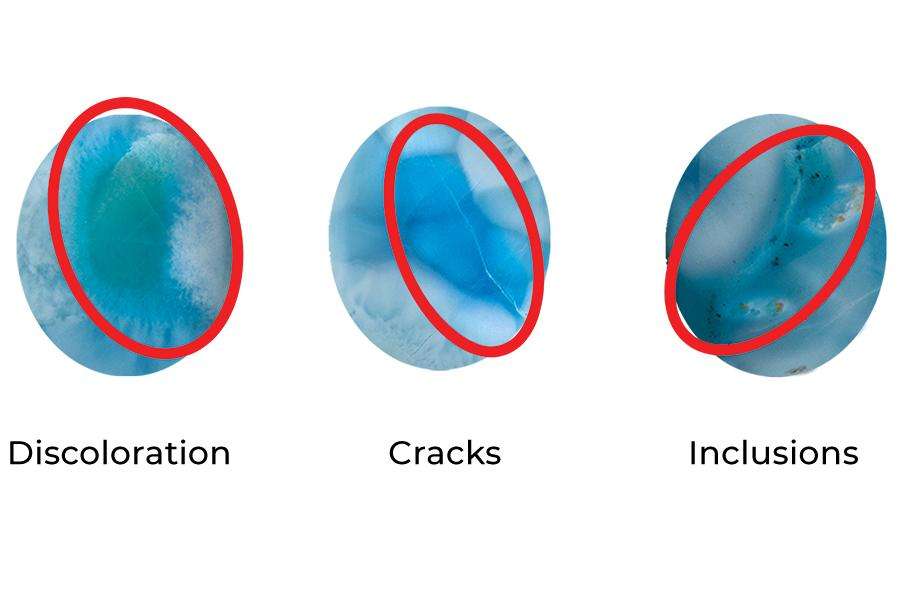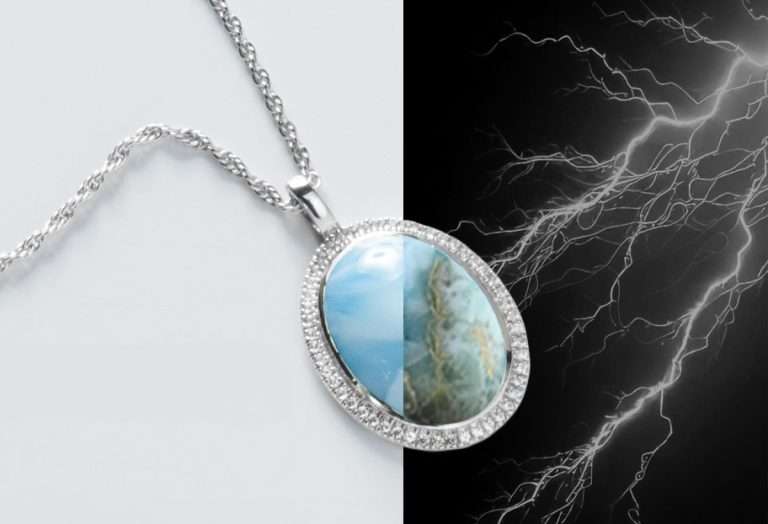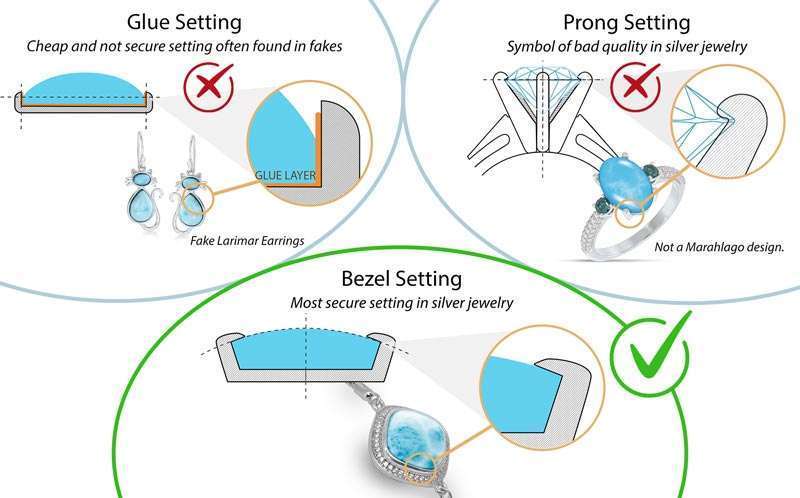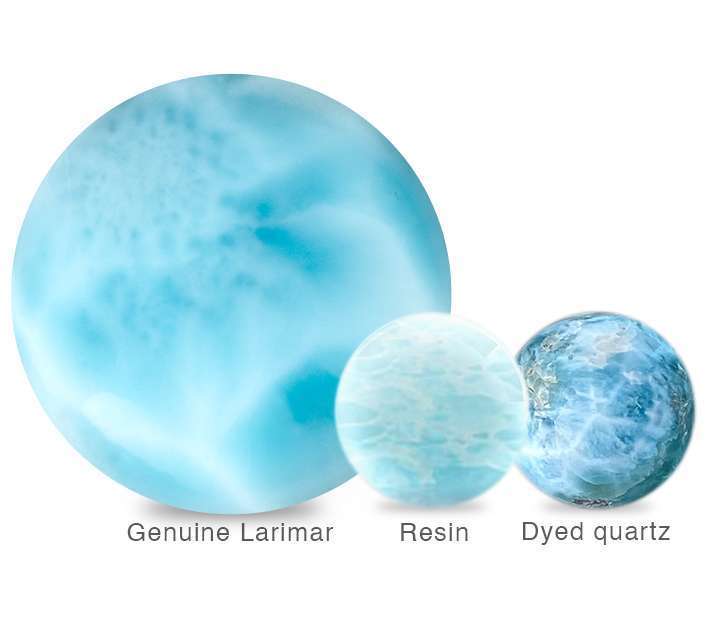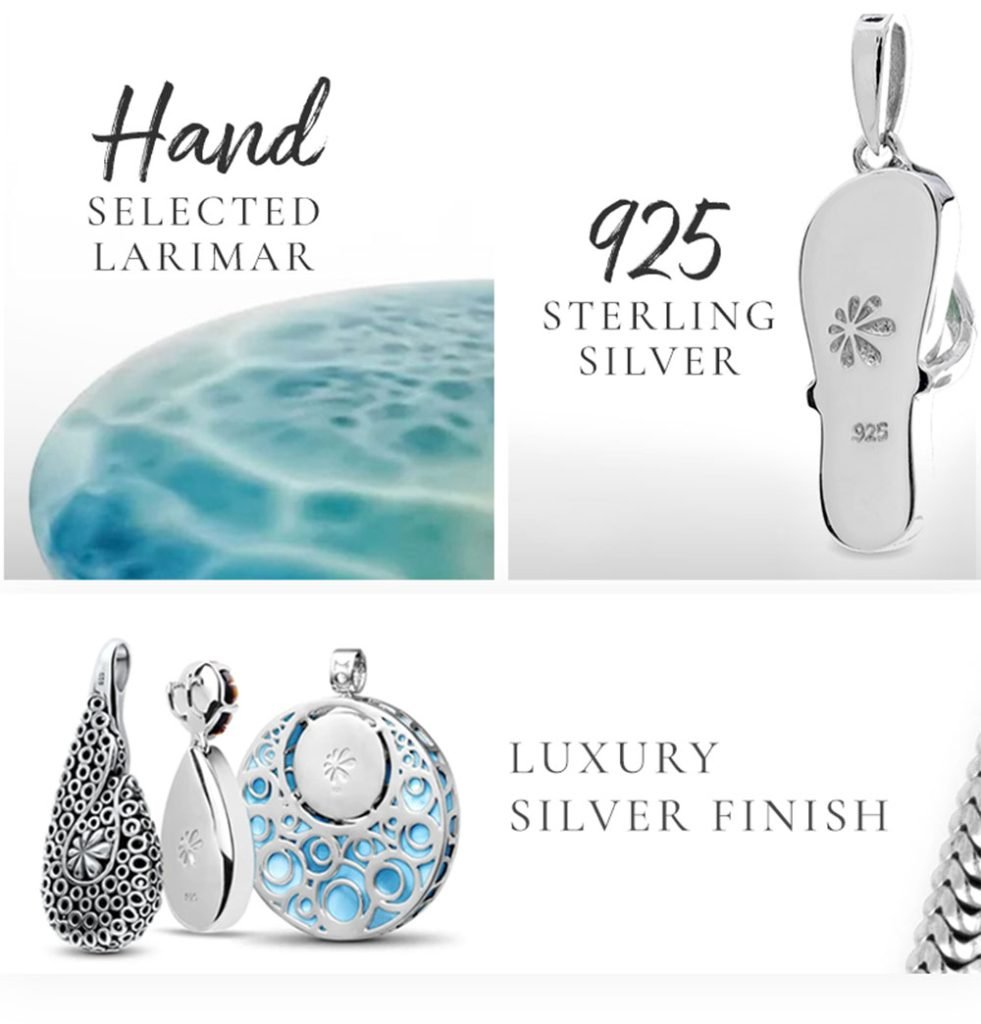Larimar’s beauty lies in its range of colors and patterns. The intensity of its blue can range from a soft white-blue to a deep blue-green.
While many prefer the intense blue shades, the choice is often subjective and based on personal preference. Equally enchanting are the patterns found on Larimar; swirling patterns, typically caused by volcanic activity, can resemble waves or clouds, adding depth and character to the stone.
However, like all gemstones, clarity is vital. A high-quality Larimar stone will have minimal inclusions or imperfections. When buying Larimar, ensure that the stone is mostly clear and that any patterns enhance its beauty rather than detract from it.
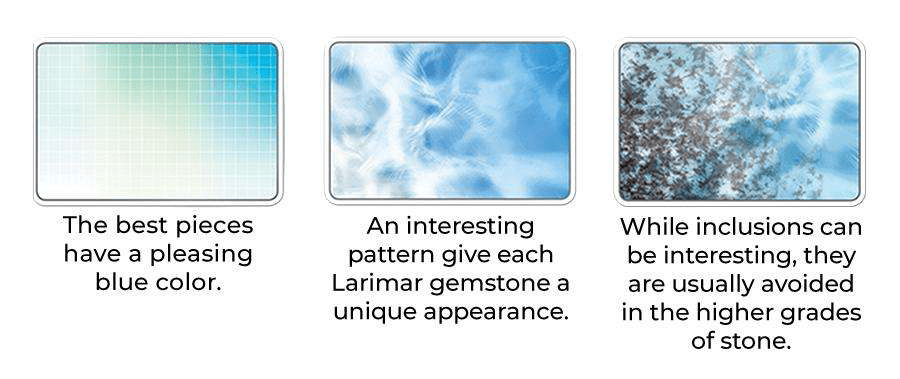
Choosing the Right Settings
The setting of a gemstone is like its frame, and for Larimar, the setting can either amplify its beauty or overshadow it.
Popular choices include sterling silver, which complements the blue tones, and gold, which offers a striking contrast. Ensure that the setting is of high quality and offers the stone adequate protection, especially for Larimar rings which can face more wear and tear.
The setting should not only be sturdy but should also allow the Larimar to be the star. Minimalistic designs often work best, but ornate settings can also be chosen if they accentuate, not overpower, the stone’s natural beauty.
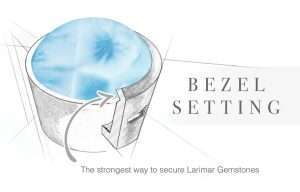
Glue VS Bezel
You need to make sure the most important part of your jewelry (the Larimar) is set securely. A vast majority of Larimar jewelry has a stone that is held in place with glue.
These are incredibly economical and easy because the silver is cast, polished, and finished and then a stone is quite simply glued into the appropriate spot. Superficially, they “look” fine, but the slightest tap can easily break that bond and cause the stone to drop off.
To determine the type of setting used, look at the edges, where the stone meets the silver. If the silver forms a tight ring that covers the edge of the stone, then it is bezel-set. If you see gaps, then it is most likely a glue setting. When the stone is set to level with the silver and they are both flat and smooth on top then it is probably an inlay setting.
Prong VS Bezel
A bezel setting is considered the most secure of all setting types because instead of using a claw to secure the stone, the bezel uses a ring of metal around the entire circumference of the gemstone. In addition to holding the gem in place it also l protects it from potential damage.
Sterling silver is far too malleable to use prong settings, especially on a larger stone such as Larimar. Quite simply, the silver is not strong enough to securely hold the stone in place. Most silver designs using prongs seem to have been designed for use with gold and other gemstones
Other Setting Methods
Setting gemstone jewelry with a bezel is very secure but requires highly skilled workers to cut the right shape of a stone and silversmiths to actually “roll” the bezel. The bezel setting is very time-consuming, so many companies offer a lower-priced alternative that is known as a “fake Bezel”.
To make a fake bezel, silver wire is rolled into an “L” shape. Then the stone is placed in the bottom and the sides are then pushed against the stone to try and hug it as much as possible. Glue is often added to keep it more secure. These settings resemble a bezel, but because the silver is not actually folded over the top of the stone, they are not as secure. It is usually pretty easy to push the stone from the back and pop it out.
A common tell tale sign of a fake bezel is an open back where the back of the piece is just a thin strip of silver around the edge. At Marahlago, we prefer to use closed backs to make sure the stone is protected on all sides.
Some people might specifically want open backs for Metaphysical purposes; however, generally speaking, in the jewelry industry, this is a cost-cutting measure and is indicative of low-cost workmanship.
YOU MIGHT BE INTERESTED: Bezel Setting Guide
Pricing
Larimar’s price can vary significantly based on several factors.
The stone’s size, quality, setting material, and craftsmanship all play a role in its cost. Larger stones of high clarity and vibrant color typically command higher prices.
Spotting Real & Fake Larimar
1. Color and Pattern:
Genuine Larimar typically showcases a spectrum of blue shades, ranging from soft white-blue to deep blue-green. While it might have red or brown veining due to oxidation, it shouldn’t have bright or artificial-looking color streaks. On the other hand, fake Larimar often appears too consistent in color and lacks the intricate patterns of the real stone.
2. Temperature Test:
Real Larimar remains cool to touch even in warm conditions due to its natural properties. A quick way to test this is to place the stone against your cheek. If it feels unusually warm or adjusts to ambient temperature too quickly, it might be a synthetic or imitation stone.
3. Price Too Good To Be True:
If a deal seems too good to be true, it probably is. Authentic Larimar can be expensive, especially for high-quality pieces. A piece that’s being sold at a significantly lower price might be a red flag for its authenticity.
4. Check for Bubbles:
Using a magnifying glass, closely inspect the stone. Genuine Larimar might have minuscule cavities, but it shouldn’t have tiny bubbles. The presence of bubbles is often an indication of resin or plastic materials, signifying a fake.
5. Stone Cutting:
